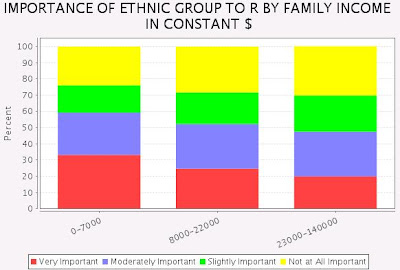The General Social Survey asks how important ethnic group membership is to your sense of who you are. Here is how whites (1st) and blacks (2nd) respond, split up into the upper, middle, and lower thirds of the black income distribution:


As whites become richer, they rely less and less on their ethnicity to define themselves, while the opposite is true for blacks. Blacks of all income groups are more likely than whites to be highly racially conscious (i.e. by answering "very important"), but this gap widens as we move up the income scale -- from about 30 percentage points among the poorest third to over 50 percentage points among the richest third. There is greater race polarization among the rich than among the poor, which rules in favor of the idea that ideology is costly and so that the rich consume more of it than the poor. (Wealthy whites do not consume pro-white ideology but rather an ideological form of cosmopolitanism.)
This result is similar to the Republican - Democrat gap that widens as you move up the income scale, as shown by Andrew Gelman and colleagues in Red State, Blue State, Rich State, Poor State. They come to the same conclusion that arguing over Starbucks, gas-guzzling SUVs, etc., is due to post-materialism -- something you indulge in after your basic financial needs are well taken care of.
Another question asks if you believe harmony in the US is best achieved by down playing or ignoring racial differences. This is the Rodney King view, the opposite of the Malcolm X view. Here are the results for whites (1st) and blacks (2nd):


Whites feel virtually the same across income groups, while richer blacks are less likely to agree with the Rodney King view and more likely to stand strongly against it. Again we see greater race polarization as we look at higher-earning people, which reinforces the post-materialist take on how and why ideology varies across income levels.
GSS variables used: ethimp, ethignor, race, realinc

No comments:
Post a Comment